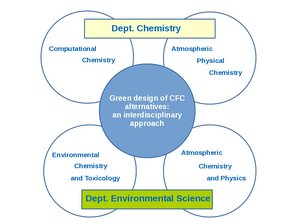
The Montreal and Kyoto protocols embody the environmental policy arising from the deep concern on global climate change and its effect on Earth. Understanding and dealing with this problem is one of the greatest scientific and social challenges for the future.
The present proposal addresses such challenges. I will focus on reactions involving hydrofluoropolyethers (HFPEs), used as substitutes of hazardous chlorofluorocarbons and related compounds in a wide variety of applications. The main objective of this proposal is to determine the environmental impact of a promising new class of HFPEs, by using molecular modelling methods in order to investigate the mechanisms and kinetics associated with their tropospheric degradation. This new class of HFPEs is recent with practically no existing data related to its environmental chemistry. I will evaluate their claimed low environmental burden by studying the OH initiated oxidation reaction rate constants of dimethoxyfluoropolyethers (a subset of this new class) and by analyzing the degradation reactions of the only products of the previous reaction: fluorinated esters. Here, two possible loss mechanisms will be considered: reaction with OH and uptake/hydrolysis by models of water droplets.
These pioneering calculations will try to break new ground and unveil fundamental aspects of the unestablished atmospheric chemistry of such HFPEs, hopefully allowing for the discovery of new alternatives for the production of new greener replacements through eco-friendly industrial processes.
Project title:
Green design of CFC alternatives: an interdisciplinary approach
Area of research:
Chemical Sciences
Fellowship period:
1 Oct 2016 – 31 Dec 2018
Fellowship type:
AIAS-COFUND Marie Skłodowska-Curie fellow

This fellowship has received funding from the European Union’s Seventh Framework Programme for research, technological development and demonstration under the Marie Skłodowska-Curie grant agreement No 609033 and The Aarhus University Research Foundation.

